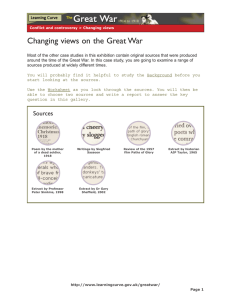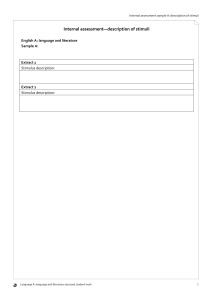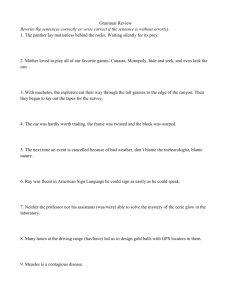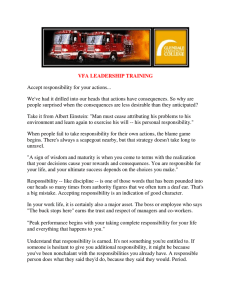Uploaded by
Akhil G
Language Analysis & Reading Skills Worksheet
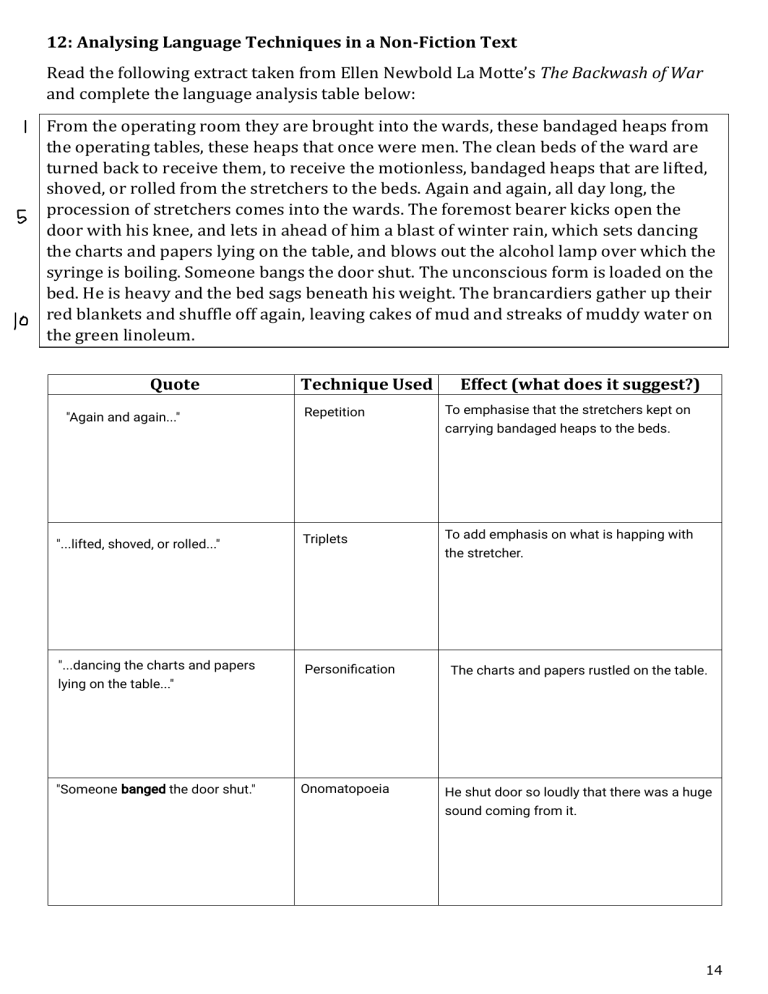
12: Analysing Language Techniques in a Non-Fiction Text Read the following extract taken from Ellen Newbold La Motte’s The Backwash of War and complete the language analysis table below: From the operating room they are brought into the wards, these bandaged heaps from the operating tables, these heaps that once were men. The clean beds of the ward are turned back to receive them, to receive the motionless, bandaged heaps that are lifted, shoved, or rolled from the stretchers to the beds. Again and again, all day long, the procession of stretchers comes into the wards. The foremost bearer kicks open the door with his knee, and lets in ahead of him a blast of winter rain, which sets dancing the charts and papers lying on the table, and blows out the alcohol lamp over which the syringe is boiling. Someone bangs the door shut. The unconscious form is loaded on the bed. He is heavy and the bed sags beneath his weight. The brancardiers gather up their red blankets and shuffle off again, leaving cakes of mud and streaks of muddy water on the green linoleum. Quote Technique Used Effect (what does it suggest?) Repetition To emphasise that the stretchers kept on carrying bandaged heaps to the beds. "...lifted, shoved, or rolled..." Triplets To add emphasis on what is happing with the stretcher. "...dancing the charts and papers Personification "Again and again..." lying on the table..." "Someone banged the door shut." Onomatopoeia The charts and papers rustled on the table. He shut door so loudly that there was a huge sound coming from it. 14 13: Skimming and Scanning a Non-Fiction Text for Details Read the following extract taken from a 2002 article published in The Guardian called Badgers Fall Prey to Blood Sport Revival: Badger-baiting has become Britain's deadliest blood sport, with a record 20,000 deaths forecast this year. An unexpected resurgence in the gruesome pursuit, in which dogs are set on badgers, has prompted the RSPCA and the police to launch the first national campaign next month aimed at capturing offenders. A £1,000 reward will be offered for anyone with information leading to a conviction for badger-baiting. Chief Inspector Terry Spamer, of the RSPCA's special intelligence unit, said there had been an 'explosion' in killings of the protected species, Britain's largest carnivorous mammal, particularly in Wales, Lancashire, Yorkshire and Scotland. The RSPCA has collated intelligence on 4,000 individuals suspected of involvement in the practice. A decade after the introduction of the Protection of Badgers Act, 1992, the comeback of badger-baiting has stunned animal welfare groups. The estimated death toll this year is double last year's, and far higher than the 13,987 foxes officially killed by hunts last season. 'It has become very prevalent in the last few months after dying off in the Eighties and Nineties,' said Spamer. Circle the letters of the four statements below that are true: a) A reward of £100 will be paid for information leading to a conviction for badger baiting. b) The badger is Britain’s largest carnivorous mammal. c) The death toll is far higher than that of foxes killed through hunting. d) The RSPCA are launching a national campaign. e) Five convictions were made in Scotland. f) There were many killings in Wales. g) Badger baiting died off in the Seventies. 15 14: Drawing Conclusions from a Text Read the following extract taken from The Lion Children: A gun is fired. Startled antelopes look up from their grazing as the noise echoes across the savanna. As the reverberation fades, one of Africa’s most incredible animals struggles to take his last breath through his punctured lungs. All is quiet apart from the sound of the hunter’s footsteps on the brittle grass. He squats by the bloodstained carcass, still holding his gun, and smiles as his picture is taken. Victory shots are fired into the air as the proud hunter gets into the car, driven by his guide, and goes back to the hunting camp where he is served a meal and a stiff drink. The skinners then get to work carefully removing the tawny coat from the carcass. Vultures circle above the mass of meat and, as the last car leaves, they descend and finish off what the hunter has left behind. One of the most magnificent male lions in our study area has been killed. Armagnac will soon be flown halfway across the world, where on arrival his head will be stuffed and mounted on the hunter’s wall, along with the photograph. His skin will be used as a carpet, and the hunter will tell his friends about his trip to Africa, with a few embellishments. Above him Armagnac will stare into oblivion with his new glass eyes. A student, having read this extract, claimed: ‘The writer makes the reader feel as though they are deeply saddened and disgusted by the death of the lion.’ Complete the table below by finding three quotes that prove this statement, and explain why. Try to refer to the specific use of language by the writer: Quotation from the extract Explanation "One of the most magnificent male lions in our study area has been killed." This statement uses emotive language to tell the reader that one of the most striking lions has been killed. "...with a few embellishments." The magnificent male lion has been killed just to be piece of show to be displayed in front of his friends. "...will stare into oblivion with his new glass eyes." The Armagnac will stare from the wall with its glass eyes and will soon be forgotten. 16 15: Tackling Unfamiliar Language 19th and 20th century English language is often very different to the language we read today. Use a dictionary or an online resource to find the definitions of the following popular words used during this time that may appear in one of your unseen texts: Word hearth tolerable rotund Definition the floor of a fireplace able to be endured. (of a person) large and plump; (of speech or literary style) sonorous; grandiloquent. dynastic relating to a line of hereditary rulers of a country; relating to a succession of people from the same family who play a prominent role in business, politics, or another field. amiable having or displaying a friendly and pleasant manner. ruffian infallible beguile malodorous diminutive infatuated benevolence a violent criminal or troublemaker. incapable of making mistakes or being wrong. charm or enchant someone, often in a deceptive way. smelling very unpleasant. extremely or unusually small. possessed with an intense but short-lived passion or admiration for someone. an act of kindness or an inclination to be kind. 17 16: Identifying Figurative Language in an Extract Read the following description of setting taken from Bram Stoker’s Dracula: Soon we were hemmed in with trees, which in places arched right over the roadway till we passed as through a tunnel. And again great frowning rocks guarded us boldly on either side. Though we were in shelter, we could hear the rising wind, for it moaned and whistled through the rocks, and the branches of the trees crashed together as we swept along. It grew colder and colder still, and fine, powdery snow began to fall, so that soon we and all around us were covered with a white blanket. The keen wind still carried the howling of the dogs, though this grew fainter as we went on our way. The baying of the wolves sounded nearer and nearer, as though they were closing round on us from every side. I grew dreadfully afraid, and the horses shared my fear. Complete the following table analysing the use of figurative language in this extract: Quote Technique Used vivid vocabulary: adjective ‘great frowning rocks guarded adverb us boldly on either side’ verb Effect The rocks were blocking the road. The wind makes the sounds as it rises. ‘we could hear the rising wind, for it moaned and whistled’ onomatopoeia They were covered with snow. ‘soon we and all around us were covered with a white blanket’ metaphor ‘the keen wind still carried the personification howling of the dogs’ The consistent wind made the howling of the dogs through the trees. 18 17: Considering an Author’s Word Choice Read through the extract below. Some of the words have been removed. Use the word bank at the bottom of the page to fill the gaps with appropriate vocabulary: stone The room in which the boys were fed, was a large .................... hall, with a copper* at one end, out of which the master, dressed in an apron for the purpose, and assisted by one or two women, ladled the gruel at meal-times; of which composition each boy had one porringer*, and no more – except on festive occasions, and then he had two ounces and a quarter of bread besides. The bowls never wanted washing – the boys polished them with their spoons till they shone again; and when they had performed this operation, (which never took very long, the spoons being nearly as large as the bowls,) they would sit staring at the copper with such desperate devour .................. eyes, as if they could ................... the very bricks of which it was composed; employing themselves meanwhile in sucking their fingers most assiduously, with the view of catching up any stray splashes of gruel that might have been cast thereon. Boys have generally excellent appetites. Oliver Twist and his companions suffered the eager tortures of slow starvation for three months: at last they got so voracious and .................. .................. with hunger, that one boy, who was tall for his age, and hadn't been used to that sort of fear thing (for his father had kept a small cook’s shop,) hinted ................ to his companions, that unless he had another basin of gruel *per diem, he was afraid he should some night happen to eat the boy who slept next him, who happened to be a weakly youth of tender age. He had a wild, hungry eye, and they implicitly believed him. A council was held; lots were cast who should walk up to the master after supper that evening, and ask for more; and it fell to Oliver Twist. The evening arrived; the boys took their places; the master in his cook's uniform, stationed himself at the copper; his pauper assistants ranged themselves behind him; the gruel was served out, and a long grace was said over the short commons. The gruel disappeared, and the boys whispered each other and winked at Oliver, while his next wild neighbours nudged him. Child as he was, he was .................... with hunger and reckless darkly with.....................He rose from the table, and advancing, basin and spoon in hand, to the master, said, somewhat alarmed at his own temerity – “Please, sir, I want some more.” The master was a fat, healthy man, but he turned very pale. He gazed in stupefied rebel astonishment on the small ................... for some seconds, and then clung for support to the misery copper. The assistants were paralysed with wonder, and the boys with .................. 1) eager 2) tortures 3) devour 4) fear 5) desperate 6) darkly 7) stone 8) wild 9) rebel 10) misery 19 18: Analysing the Author’s Use of Characterisation Read the following extract taken from John Steinbeck’s Of Mice and Men: A girl was standing there looking in. She had full, rouged lips and wide-spaced eyes, heavily made up. Her fingernails were red. Her hair hung in little rolled clusters, like sausages. She wore a cotton house dress and red mules, on the insteps of which were little bouquets of red ostrich feathers. ‘I’m lookin’ for Curley,’ she said. Her voice had a nasal, brittle quality. George looked away from her and then back. ‘He was here a minute ago, but he went.’ ‘Oh!’ She put her hands behind her back and leaned against the door frame so that her body was thrown forward. ‘You’re the new fellas that just come, ain’t ya?’ ‘Yeah.’ Lennie’s eyes moved down her body, and though she did not seem to be looking at Lennie she bridled a little. She looked at her fingernails. ‘Sometimes Curley’s in here,’ she explained. George said brusquely, ‘Well, he ain’t now.’ ‘If he ain’t, I guess I better look some place else,’ she said playfully. Lennie watched her, fascinated. George said, ‘If I see him, I’ll pass the word you was looking for him.’ She smiled archly and twitched her body. ‘Nobody can’t blame a person for lookin’,’ she said. There were footsteps behind her, going by. She turned her head. ‘Hi, Slim,’ she said. Answer the following question using the P.E.E. guidelines below: How does the writer use language to present the character of Curley’s wife? Point: Evidence: Explanation: 20 19: Identifying Persuasive Techniques in a Speech Read the following speech by a father whose son was killed in a hit and run while trying to protect his neighbourhood from looters and rioters during the 2011 London riots: I don’t blame the Government, I don’t blame the police, I don’t blame anybody. I’m a Muslim. I believe in divine fate and destiny, and it was his destiny and his fate, and now he’s gone. And may Allah forgive him and bless him. Tensions are already high in the area. It’s already bad enough what we are seeing on the streets without other people taking the law into their own hands. My family wants time to grieve for my son. People should let the law deal with this. Today we stand here to plead with all the youth to remain calm, for our communities to stand united. This is not a race issue. The family has received messages of sympathy and support from all parts of society. I lost my son. Blacks, Asians, Whites – we all live in the same community. Why do we have to kill one another? Why are we doing this? Step forward if you want to lose your sons. Otherwise, calm down and go home – please. Identify the persuasive techniques used in the speech in the table below and comment on their effect on the listener: Technique Example Effect Rhetorical question "Why are we doing this?" It keeps the reader thinking on why people kill their own kind. Emotive language "...received messages of sympathy and support..." People from all parts of society feels sad for their loss. Repetition Use of personal pronouns "I can't blame....I can't blame....I can't blame. I, We, My Step forward if you want to lose your sons. Imperatives Persuades the reader to not blame the government, police, or anybody. We include the reader/audience in the situation. It makes the reader feel his pain about losing his son. 21 20: Punctuating Writing for Clarity and Coherence Re-write the following extracts below, adding appropriate punctuation to add control and coherence: When the history of sport comes to be written one of the greatest most enduring chapters will be devoted to englands world cup win in 1966 why was it such an achievement perhaps because the manager sir alf ramsey said very simply a year before the tournament england will win the world cup and they did. When the history of sport comes to be written, one of the greatest and most enduring chapters will be devoted to England's World Cup win in 1966. Why was it such an achievement? Perhaps because the manager, sir Alf Ramsey, said very simply a year before the tournament, England would have won the World Cup, and they did. Would you make a child drink dirty water of course you wouldn’t but that is what millions of children in Africa do every day and thousands die every year from water borne diseases think of this for just 60 pence a day you could provide clean water for a village and ensure that children have a better to chance to live to adulthood surely that isn’t too much to ask or is it Would you make a child drink dirty water? Of course, you wouldn’t, but that is what millions of children in Africa do every day and thousands die every year from water borne diseases. Think of this: for just 60 pence a day, you could provide clean water for a village and ensure that children have a better chance to live to adulthood. Surely that isn’t too much to ask? 22
